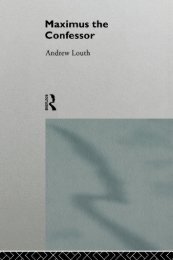Gospels of Thomas and Philip and Truth - Syriac Christian Church
Gospels of Thomas and Philip and Truth - Syriac Christian Church
Gospels of Thomas and Philip and Truth - Syriac Christian Church
Create successful ePaper yourself
Turn your PDF publications into a flip-book with our unique Google optimized e-Paper software.
evolving after the invasion <strong>of</strong> Alex<strong>and</strong>er the Great (332 BC) <strong>and</strong> subsequently<br />
supplanted by Arabic following the Muslim conquest (640 AD); see Biblio.20. It has<br />
always been the liturgical language <strong>of</strong> the Egyptian <strong>Church</strong>; moreover, the ancient<br />
Coptic versions <strong>of</strong> the Old <strong>and</strong> New Testaments are <strong>of</strong> great importance in textual<br />
Biblical studies. Utilizing many Greek loan words, Coptic also adopted the<br />
Greek alphabet, adding these letters: 4 (shai), 3 (fai), 6 (hori), ` (janja), 2 (gima), <strong>and</strong><br />
5 (ti), as well as ¯ (syllable or abbreviation indicator); see P001 <strong>and</strong> www.proel.org/<br />
alfabetos/copto.html. English terms which derive from ancient Egyptian via Coptic<br />
include ‘pharaoh’ (Coptic p.r-ro: the-king, P080 C299a), ‘adobe’ (Coptic twwbe:<br />
brick, C398a; via Arabic <strong>and</strong> Spanish), ‘oasis’ (from Egyptian via Greek; Coptic<br />
parallel oua6e, C508b), <strong>and</strong> ‘manna’ (Coptic moone: to feed, C173a). ‘C...’ <strong>and</strong> ‘P...’<br />
are references to pages/sections in Crum's Dictionary <strong>and</strong> Plumley's Grammar<br />
(Biblio.4+5).<br />
Adam (46 85): Heb Md) (blood-red, clay)— the original human <strong>and</strong>/or generic<br />
mankind.<br />
Aesop (102 109): crippled Gk slave who flourished in the 6th-century BC <strong>and</strong><br />
was executed at Delphi for ‘impiety’, whose Fables were well-known thruout the<br />
ancient world; the only non-Israelite other than the Delphic Oracle (‘Recognize<br />
thyself’: Th 3) whom Christ is known to have quoted, as also in Lk 4:23 (moral from<br />
‘The Quack Frog’), Mt 7:15 (‘The Wolf in Sheep's Clothing’) <strong>and</strong> various other<br />
allusions.<br />
All (77): see Totality.<br />
Bear (101): interpolated Coptic text:<br />
ta.maau gar n-ta.[s.mast ero.i eb]ol<br />
P050, C197a Gk P202+186b, P035, C184b, P039 P261.7, P035 C034a<br />
my-mother For did(II)-[she-bear accusative-me for]th.<br />
I assume that the inclusion here <strong>of</strong> the pronominal ero.i is for clarity <strong>and</strong> emphasis,<br />
as the first-person singular suffix -i is omitted after mast= (the Pronominal Form <strong>of</strong><br />
mise): see P039; image <strong>of</strong> the papyrus: www.metalog.org/files/pap.gif.<br />
Bed (61b, NB as also in 61a): the Coptic text here is:<br />
a.k.telo e`m- pa.glog<br />
45




